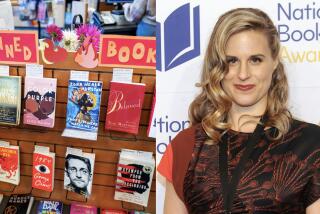In dark ‘The Book Thief,’ Sophie Nélisse is a bright spot
POTSDAM, Germany — Biting cold and a blue, blue April sky marked the day as perfect for a foot race.
On the back lot of Babelsberg Film Studio here outside of the German capital, young actors Sophie Nélisse and Nico Liersch took their marks, got set and dashed off through the cobblestoned snow, laughter bouncing and blond heads glinting in the sun. Their characters — best friends Liesel Meminger and Rudy Steiner — are bright lights in a story that edges on darkness. Death begins and ends the tale; in fact, he even narrates it.
A few feet away, watching captivated by the sight and the sounds in his headphones, was Liesel’s creator, Australian author Markus Zusak. His beloved 2006 international bestseller “The Book Thief” takes Liesel through literacy, love and loss in one of the grimmest periods and places in history, Nazi Germany.
Adapted by Michael Petroni and directed by Brian Percival (“Downton Abbey,” “North & South”), the 20th Century Fox version of “The Book Thief” (in limited release Nov. 8) features a top-drawer cast, including Geoffrey Rush and Emily Watson as Liesel’s foster parents, Hans and Rosa Hubermann. They are ordinary but exceptional in their kindness and decency, first to orphaned Liesel, then to Max Vandenburg (newcomer Ben Schnetzer), a Jew in desperate need of a hiding place.
But the film rests on the small but determined shoulders of Nélisse, a French-speaking Canadian performer who turned 13 during filming. For Liesel, all the world’s a page. Books are mystery, danger, comfort and savior — both totem and tool of transformation. Many involved in the film say Nélisse, in her first English-speaking role, proved as captivating as the character she plays.
The filmmakers held auditions for the Liesel role throughout Britain, Europe, Australia and in Los Angeles. “We only had one director involved, we only had one screenwriter, we went to one Hans, but we did a worldwide search for Liesel,” said Karen Rosenfelt (“The Twilight Saga,” “The Devil Wears Prada”), who produced the film with her husband, Ken Blancato. But Zusak finally found her on-screen — Nélisse was part of the cast of Canada’s “Monsieur Lazhar,” which was nominated for the 2012 foreign language Oscar.
ON LOCATION: Where the cameras roll
“We knew so much of the success of the film would be down to how well Liesel was played,” said Percival. “She is the character of the film really, so it was important to get that right, and I think we have.”
Alternately wrenching and uplifting, “The Book Thief” is based partly on stories Zusak heard from his parents, who experienced World War II as children in Germany and Austria. It took him three intense years to write; at the end, he says, he thought he’d be stuck with a dud. Even if someone did read the novel and loved it, he says, how would they recommend it to friends?
“Well, it’s set in Nazi Germany, it’s narrated by Death, and nearly everybody dies, it’s 580 pages long, you’ll love it!” he said with a laugh.
The journey from page to screen began before Zusak even knew just how popular the book would be. It started with a leftover copy of the Wall Street Journal in a Starbucks. Rosenfelt picked it up to read with her coffee, and a publishing blurb caught her eye. It described an upcoming young adult book with a particularly tough subject matter and a dauntingly high page count. Rosenfelt was intrigued. She requested the manuscript, read it over a three-day weekend and called Fox 2000 on Tuesday and pitched the project.
PHOTOS: Behind the scenes of movies and TV
“I never viewed this as a Holocaust movie, I never viewed it as a war movie,” she said. “I always viewed it as a movie about people.”
Percival has directed several literary adaptations for British television, but “The Book Thief” is his first Hollywood film. Calling Zusak’s novel an “instruction manual,” he said he let intentions and feelings influence the visual language of his filmmaking rather than trying to replicate the novel’s well-described landscapes and scenes. He also did not want to rely excessively on one of the novel’s best-known attributes, its wry narrator, voiced in the film by Roger Allam (“Game of Thrones,” “The Thick of It.”)
“The whole book is narrated by Death, but instead of constantly having Death narrate … I just tried to do it in more of a kind of subtle way, at least for film, where the camera uses high viewpoints quite a lot,” Percival said. “So that we just get the impression that we’re looking down on these situations and what has happened but do it in a quite subtle way instead of to overly use his voice.”
Although “The Book Thief” was marketed in several regions as a young adult novel, the original story and the film have brutal and devastating moments. The movie has been rated PG-13, and Rush believes it’s suitable for moviegoers as young as some of the protagonists, say 11 or 12 years old.
“You can only understand one side of the coin if you really let the other side be as dark as it is,” he said, “and not try to smooth it out to acceptable film ratings and marketing strategies.”
More to Read
Only good movies
Get the Indie Focus newsletter, Mark Olsen's weekly guide to the world of cinema.
You may occasionally receive promotional content from the Los Angeles Times.






